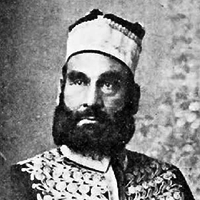ALL
Profile
Ghazal181
Sher195
E-book125
TOP 20 SHAYARI 20
Image Shayari36
Audio45
Video66
Qita2
Qisse5
Blog5
Other
Naat1
Profile of Dagh Dehlvi
Pen Name : 'Dagh'
Real Name : Nawab Mirza Khan
Born : 25 May 1831 | Delhi
Died : 17 Mar 1905 | Hyderabad, Telangana
Relatives : Mahmood Rampuri (Disciple), Bekhud Badayuni (Disciple), Bekhud Dehlvi (Disciple), Hasan Barelvi (Disciple), Seemab Akbarabadi (Disciple)
LCCN :n84086596
ḳhuub parda hai ki chilman se lage baiThe haiñ
saaf chhupte bhī nahīñ sāmne aate bhī nahīñ
what coyness this is, to abide,a screen beside her face
which neither does she clearly hide nor openly display
KHub parda hai ki chilman se lage baiThe hain
saf chhupte bhi nahin samne aate bhi nahin
what coyness this is, to abide,a screen beside her face
which neither does she clearly hide nor openly display
Nawab Mirza Khan Dagh Dehlavi (1831-1905), was born and brought up in the red fort of Delhi where his mother was married to prince Mirza Mohammad Sultan, son of Bahadur Shah Zafar. After his father’s death, he had to leave the red fort, and after the fall of Delhi in 1857, he had to move to Rampur where he lived in comfort for more than a decade. Later, his changing conditions, for good or bad, took him to other centres of renown like Lucknow, Patna, Calcutta, and Hyderabad.
As a disciple of Zauq himself, and with a large number of eminent disciples to his own credit, Dagh deliberated upon the aesthetic principles of ghazal as a form of intimate poetic conversation. He charged the common speech and combined the poetic manners of the Lucknow and Delhi schools. In its totality, Dagh’s poetry is idiomatic and appealing, laden with emotions and good humour. He did not take the idea of love to philosophical heights but engaged with the experience of love at a human level, bringing it close to eroticism. Cumulatively, he is playful with language, least Persianised in his diction, witty in turns of phrases, urbane in addressing, and full of gaiety and simplicity in his essential approach to his material. Apart from his four divaans, representing the last hallmarks of classical poetry, he has left behind a bunch of letters and a long narrative poem.
USEFUL LINKS : | http://www.thehindu.com/news/cities/Hyderabad/dagh-was-the-toast-of-the-town-in-his-heydays/article3013732.ece | http://www.columbia.edu/itc/mealac/pritchett/00urduhindilinks/abdulqadir/04dagh.pdf
Tagged Under
Authority Control :The Library of Congress Control Number (LCCN) : n84086596

